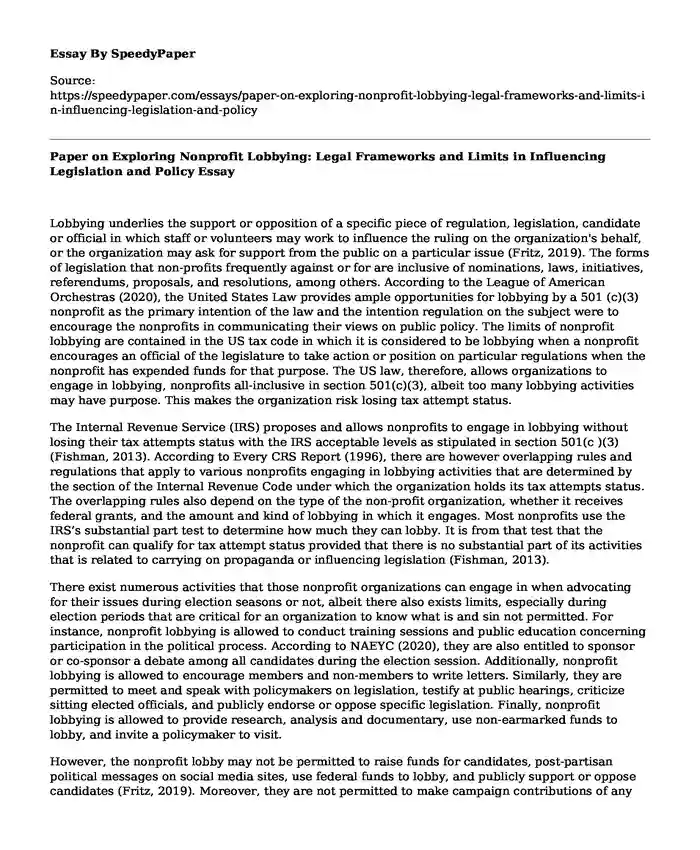Lobbying underlies the support or opposition of a specific piece of regulation, legislation, candidate or official in which staff or volunteers may work to influence the ruling on the organization's behalf, or the organization may ask for support from the public on a particular issue (Fritz, 2019). The forms of legislation that non-profits frequently against or for are inclusive of nominations, laws, initiatives, referendums, proposals, and resolutions, among others. According to the League of American Orchestras (2020), the United States Law provides ample opportunities for lobbying by a 501 (c)(3) nonprofit as the primary intention of the law and the intention regulation on the subject were to encourage the nonprofits in communicating their views on public policy. The limits of nonprofit lobbying are contained in the US tax code in which it is considered to be lobbying when a nonprofit encourages an official of the legislature to take action or position on particular regulations when the nonprofit has expended funds for that purpose. The US law, therefore, allows organizations to engage in lobbying, nonprofits all-inclusive in section 501(c)(3), albeit too many lobbying activities may have purpose. This makes the organization risk losing tax attempt status.
The Internal Revenue Service (IRS) proposes and allows nonprofits to engage in lobbying without losing their tax attempts status with the IRS acceptable levels as stipulated in section 501(c )(3) (Fishman, 2013). According to Every CRS Report (1996), there are however overlapping rules and regulations that apply to various nonprofits engaging in lobbying activities that are determined by the section of the Internal Revenue Code under which the organization holds its tax attempts status. The overlapping rules also depend on the type of the non-profit organization, whether it receives federal grants, and the amount and kind of lobbying in which it engages. Most nonprofits use the IRS’s substantial part test to determine how much they can lobby. It is from that test that the nonprofit can qualify for tax attempt status provided that there is no substantial part of its activities that is related to carrying on propaganda or influencing legislation (Fishman, 2013).
There exist numerous activities that those nonprofit organizations can engage in when advocating for their issues during election seasons or not, albeit there also exists limits, especially during election periods that are critical for an organization to know what is and sin not permitted. For instance, nonprofit lobbying is allowed to conduct training sessions and public education concerning participation in the political process. According to NAEYC (2020), they are also entitled to sponsor or co-sponsor a debate among all candidates during the election session. Additionally, nonprofit lobbying is allowed to encourage members and non-members to write letters. Similarly, they are permitted to meet and speak with policymakers on legislation, testify at public hearings, criticize sitting elected officials, and publicly endorse or oppose specific legislation. Finally, nonprofit lobbying is allowed to provide research, analysis and documentary, use non-earmarked funds to lobby, and invite a policymaker to visit.
However, the nonprofit lobby may not be permitted to raise funds for candidates, post-partisan political messages on social media sites, use federal funds to lobby, and publicly support or oppose candidates (Fritz, 2019). Moreover, they are not permitted to make campaign contributions of any kind or cash and connect criticism of a public official to an organization to vote in an election. Finally, nonprofit lobbying is also not allowed to compare an organization’s issue position with that of a candidate during an election.
Conclusion
In a nutshell, nonprofits play a vital role in influencing legislation and policy at the local levels, federal, and state hence the need for an organization to understand the rules for lobbying before engaging in lobbying activities. The IRS proposes that a nonprofit may engage in lobbying by persuading members of the legislative body to support, oppose, amend, repeal, or propose legislation so long as the non-profit qualifies for tax attempt status after undergoing the IRS's substantial part test. The US law under section 501 (c)(3), therefore, allows nonprofits to engage in lobbying so long as they do not lose their tax-exempt status and remain at the same acceptable levels to the IRS.
References
Fishman, S. (2013, May 28). How much lobbying can a nonprofit do? www.nolo.com. https://www.nolo.com/legal-encyclopedia/how-much-lobbying-can-nonprofit-do.html
Fritz. (2019, March 18). Advocacy or lobbying? What's the difference for nonprofits? TheBalance Small Business. https://www.thebalancesmb.com/nonprofit-advocacy-vs-lobbying-which-is-the-best-strategy-4177308
League of American orchestras. (2020). League of American Orchestras. https://americanorchestras.org/advocacy-government/making-the-case-advocacy-resources/playing-your-part-an-orchestra-s-guide-to-public-policy-advocacy
Lobbying regulations on non-profit organizations. (1996, September 27). Every CRS ReportEveryCRSReport.com. https://www.everycrsreport.com/reports/96-809.html
Naeyc. (2020). NAEYC. https://www.naeyc.org/our-work/public-policy-advocacy/rules-501c3nonprofit-lobbying
Cite this page
Paper on Exploring Nonprofit Lobbying: Legal Frameworks and Limits in Influencing Legislation and Policy. (2023, Dec 06). Retrieved from https://speedypaper.net/essays/paper-on-exploring-nonprofit-lobbying-legal-frameworks-and-limits-in-influencing-legislation-and-policy
Request Removal
If you are the original author of this essay and no longer wish to have it published on the SpeedyPaper website, please click below to request its removal:
- Strictest Gun Laws by State
- Gun Control Essay Example, Free to Use
- Annotated Bibliography Example on Police Misconduct
- Is Trump the Only One to Blame for the Trade War Between USA and China? Paper Example
- Paper Example. Interoperability Practices
- Essay Sample on Investigating a Crime Scene: Evaluating Evidence & Formulating Plans
- Essay Example on U.S. Health Care Systems for Small Populations
Popular categories





